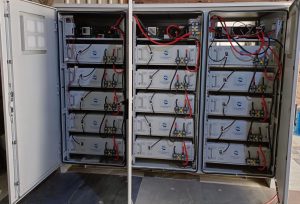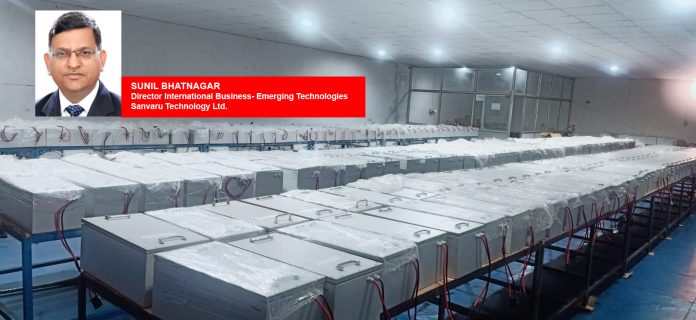Whenever we think of Electric vehicles, we think of batteries first. Among all the options available for batteries, Li-ion is the most widely used battery. Batteries are one of the most crucial components of an electric vehicle (EV) and have a direct bearing on the range, duration, and in fact cost of the EV. Over the years, steady improvements in battery technology have helped make EVs increasingly commercially viable. Lithium-ion (li-on) being the dominant one today, offers benefits like high energy density that make it ideally suited for EVs.EV Li-ion has gained traction with the surge in EV adoption among consumers. EV is the future of automotive and so are the batteries used in them.
Considering the present surge in the EV revolution, ELE Times Sub Editor Sheeba Chauhan considers this time and circumstances absolute apt to interact with “Top EV (Li-ion) Battery Manufacturers in India “. For the same Sunil Bhatnagar, Director International Business- Emerging Technologies, Sanvaru Technology Ltd. were generous to provide insights to his company.
Excerpt:
TimesEV: What is the latest technology used for manufacturing Li-ion batteries?
Sunil Bhatnagar: There are different ways to make different type of battery packs. We do LiFePO4 battery packs with cylindrical cells in soft pack for applications like solar street lights, solar home lights etc. Metal casing is used in case of EV batteries where lot of vibrations, high temperature etc.is expected. For small battery packs, spot welding is used on Nickel strips whereas for bigger EV packs laser welding is used on Prismatic cells and aluminum inter-cell strips are used as inter cell connectors. The latest trend is laser welding as it gives correct strength to the battery pack and reduces overall internal resistance of the battery pack.
TimesEV: What is your date of inception, the day you put your first foot forward into the manufacturing business of Li-ion?
Sunil Bhatnagar: We started our company Sanvaru Technology in August 2014 and made it later as Sanvaru Technology Ltd. We were amongst the first ones to enter Lithium batteries in India. In our eight years of battery making we have completed warranty cycles of 5 years in Solar and 3 years in EVs and few thousand battery packs made by us are working in field nicely.
TimesEV: How many employees are presently working with your company?
Sunil Bhatnagar: We have close to 60 people strength in our factory as some operations are semi-automated.
TimesEV: We would like to know about the company’s sales network.
Sunil Bhatnagar: Sanvaru has a supply base on all over India basis and we have supplied our batteries in almost all corners of the country starting from Leh Ladhak, Assam to Chennai, Kolkata to Mumbai and all parts of central India like UP, MP, CG and Rajasthan etc. Apart from this we are exporting our batteries to neighboring countries and also Africa etc.
TimesEV: What is the revenue of your company for last financial year?
Sunil Bhatnagar: Last 2 years were not good due to corona wave and Farmers agitation affected us much more as Farmers were sitting on our factory gate at Kundli (Sonepat district). All our activities were totally constrained due yearlong farmer’s agitation. Still we did close to Rs 50Cr despite all constraints. This year we will cross 175Cr as we have LOIs for Rs 300Cr but our production capacity is limited to Rs 175Cr. Expansion plans are under process and next plant will be coming up at Haridwar.
TimesEV: Apart from portable electronics like cell phones or laptops, what could be the latest use of Li-ion batteries?
Sunil Bhatnagar : The consumer user segment is quite different. The main market now is in EVs. Electric Vehicles market is growing at a faster pace and 2 wheelers and 3 wheelers sales are picking up in a quite good way. 2W Lithium batteries are mostly made in NCM technology as energy density is a big concern but 3W batteries are mostly made in LiFePO4 as space is not that big a constraint. In e-3W we have passenger auto segment and cargo loader segment. The passenger auto segment caters to last mile connectivity needs whereas the cargo loader segment is helpful in online order deliveries. In 4W E Bus market is coming up fast as a part of mass rapid transportation. We have some targets set at COP26 and E Bus and E Trucks will play a major role in controlling tail pipe emissions. Another good segment is E Tractors which presently has a good export market but domestic market is also coming up.
TimesEV: Will there be any alternative that can replace Li-ion batteries in the future?
Sunil Bhatnagar : Any new technology is first tested in lab for some time and then put in field trials and maturity period for any new technology is not less than 5 years in most cases. Sodium ion is making way in same domain of LiFePO4 as cell voltage and lifecycle is almost similar. Hydrogen Fuel cell is another technology which may come in E Bus, E Trucks and E cars after 2-3 years as present cost of generation of Hydrogen is not competitive. Green hydrogen generation is another challenge as electrolyser is in short supply. The cost of production of hydrogen is very high as of now due to production, storage and distribution though this is the best technology from environment preservation angle.
TimesEV: We would like to know about your present production capacity.
Sunil Bhatnagar : We have production capacity of 125MW PA. After expansion of first phase it will be close to 400MW PA.
TimesEV: What is your product profile?
 Sunil Bhatnagar: Our focus area is Lithium batteries for EVs like 3W batteries, e-Cargo & e-passenger auto batteries, e-Garbage van batteries, e-Rickshaw batteries, e -Tractor batteries and e-Truck batteries. On Solar side we are doing high voltage ESS systems mainly apart from some batteries for solar street light and home light etc. We do some batteries for medical equipment, E Cycles, AGVs etc.
Sunil Bhatnagar: Our focus area is Lithium batteries for EVs like 3W batteries, e-Cargo & e-passenger auto batteries, e-Garbage van batteries, e-Rickshaw batteries, e -Tractor batteries and e-Truck batteries. On Solar side we are doing high voltage ESS systems mainly apart from some batteries for solar street light and home light etc. We do some batteries for medical equipment, E Cycles, AGVs etc.
TimesEV: What are your future plans?
Sunil Bhatnagar: In 2022-23 we are consolidating our position and trying to come up with one more plant at SIDCUL Haridwar. We have already developed batteries for E Tractors and E Trucks (250Kwh battery pack) and we will focus on association with some OEMs in this segment. E Bus battery is also in pipeline as it’s quite similar to e-truck battery. Another vertical which is coming up is MW level containerized solution and Sanvaru is working on many fronts
Mr Bhatnagar also further added his thoughts on the unfortunate mishappening in the EV industry and said that we have seen some fire accidents happening in recent past in India and we request OEMs to trust only proven players who understand technology and please check the battery company is a technology company and not just some trading company. A proper battery pack which is made with best quality of Power cell and is equipped with a sophisticated BMS will not cost less but a cheap battery pack may look good in short term will spoil the EV wave as these fires pose a big question on buyers mind.










